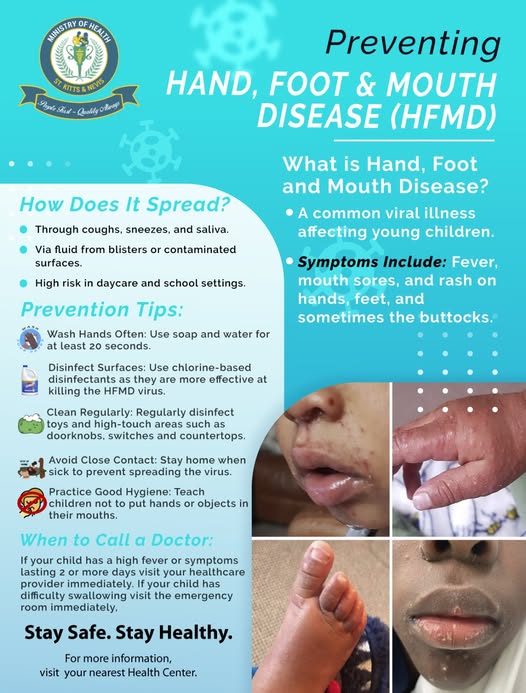Hand, Foot, and Mouth Disease Outbreak
Hand, Foot, and Mouth Disease (HFMD) is a highly contagious viral infection predominantly affecting infants and young children. Characterized by a distinctive cluster of symptoms, including fever, sore throat, painful mouth sores, and a rash on the hands, feet, and buttocks, HFMD is typically mild and self-limiting, resolving within 7-10 days. However, the discomfort associated with the symptoms, particularly the mouth sores, can significantly impact a child’s well-being, leading to decreased appetite, irritability, and difficulty eating and drinking. The virus spreads readily through close contact with an infected person, primarily via respiratory droplets expelled during coughing or sneezing, or through contact with contaminated surfaces and objects, such as toys, doorknobs, and shared utensils. The fecal-oral route also plays a role in transmission, especially in diaper-aged children. While HFMD can occur year-round, outbreaks are more common during the warmer months.
The recent outbreak of HFMD in St. Kitts and Nevis has prompted a coordinated response from the Ministry of Health and the Ministry of Education, focusing on containing the spread within the early childhood sector. Recognizing the vulnerability of young children in daycare and preschool settings, the Ministries have prioritized thorough cleaning and sanitization of affected facilities. This includes the use of bleach-based cleaning products to disinfect surfaces and shared items, a critical step in eliminating the virus from the environment. The closure of affected centers allows for comprehensive cleaning and implementation of enhanced infection prevention and control measures before reopening, minimizing the risk of further transmission. This proactive approach aims to protect children and staff and prevent a wider community outbreak.
Hygiene practices play a crucial role in preventing the spread of HFMD. Frequent handwashing, particularly after diaper changes and before meals, is paramount in interrupting the transmission cycle. Handwashing should be performed with soap and water for at least 20 seconds, ensuring thorough cleaning of all surfaces, including between fingers and under nails. Alcohol-based hand sanitizers can also be used when soap and water are unavailable. Avoiding close contact with infected individuals, such as hugging, kissing, and sharing eating utensils, is essential to minimize the risk of transmission. This is particularly important in childcare settings where close contact is unavoidable. Parents and caregivers are encouraged to educate children about the importance of these hygiene practices and to model them consistently.
Regular disinfection of frequently touched surfaces is another critical component of HFMD prevention. Doorknobs, countertops, toys, electronic devices, and other shared items should be disinfected regularly using bleach-based cleaning products. These products are effective in killing the virus on surfaces, preventing its spread. In addition to surface cleaning, proper disposal of soiled diapers and tissues is crucial to prevent contamination. Diapers should be sealed in plastic bags and disposed of in designated receptacles. Tissues used to wipe noses or mouths should be disposed of immediately and hands washed thoroughly afterward. Maintaining a clean and sanitary environment is essential in reducing the risk of HFMD transmission.
Parents and caregivers are urged to be vigilant in recognizing the symptoms of HFMD and to keep children exhibiting symptoms at home. This is crucial in preventing the spread of the illness within childcare centers and the wider community. If a child develops fever, sore throat, mouth sores, or a rash on the hands, feet, or buttocks, they should be kept home and isolated from other children. Consulting a healthcare professional is recommended if symptoms persist or worsen, or if the child develops dehydration or difficulty breathing. While HFMD is generally mild and self-limiting, complications can occur in rare cases, including viral meningitis or encephalitis. Prompt medical attention is essential in managing these complications and ensuring the child’s well-being.
The Ministry of Health in St. Kitts and Nevis is committed to containing the HFMD outbreak and protecting the health of the community. Collaborative efforts with the Ministry of Education and daycare administrators ensure comprehensive cleaning and implementation of robust infection prevention and control measures in affected facilities. Public awareness campaigns emphasize the importance of hygiene practices, prompt isolation of symptomatic individuals, and seeking medical advice when necessary. By working together, the community can effectively prevent the further spread of HFMD and safeguard the health of its youngest members. Continued vigilance, adherence to recommended hygiene practices, and prompt reporting of suspected cases are essential in mitigating the impact of this outbreak and ensuring the well-being of the community.
Share this content:












Post Comment